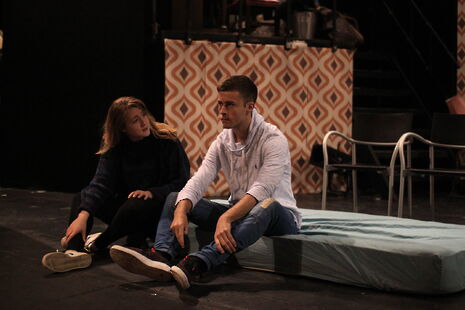Review: Caravan
The ADC’s Caravan is a well-directed production, showcasing outstanding acting and a strong set, with only some edges yet to smooth out, writes Laura Cameron

Caravan’s premise is an enticing one as we track the developments and disintegrations of a family living in the claustrophobic setting of a mobile home. From one fateful night in October 1994 we are privy to their lives spanning the next two years, always returning to this caravan. With the backdrop of political and social unrest we view the ways in which the world they’ve made for themselves is gradually pulled apart.
From pastel-coloured innocence to the dark hue of sexual experience, we are plunged straight into the turbulent life of fifteen-year old Kim in the vivid opening scene. Kim, played by Sophie Taylor, and Mick, played by Joe Shalom, enter after their evening out together with mint chocolate chip Cornettos as incredibly apt props. These perfectly frame the action of this formative exchange; at first playful and sweet it becomes unwanted and clawing. They unflinchingly tackle the hard-hitting theme of sexual assault and, with the help of the lighting slowly darkening at the climax of their scene, the transition from comically awkward interaction to serious drama is expertly achieved.
The caravan takes centre stage, and for this first scene the walls are up; we are looking at the pair intrusively through the window. First impressions of the interior are of an overwhelmingly adolescent presence, which is reflective of both the teenage girls and their mother, Josie. As their father has just died, Josie, played by Rachel Bircher, is presented as a single mother starting again. With a similar maturity level to her youngest daughter, this provides a constant tension regarding the way she conducts herself in light of this recent emotional blow.
The contrast in the sisters’ characters is the crux of this narrative, and both actors engage with this incredibly well. Laura Pujos plays Kelly in a relatable elder sister vein, displaying moments of concern for Kim mixed with dismissal and a definite sense of superiority. Her character development is especially strong leading into the climatic exchange between Kelly and Mick in the second act. As the younger sister, Taylor is especially adept in her physical acting; she fluidly changes from teenage cockiness to sulkiness to a crippling vulnerability conveyed so well after moments where she is reminded of that night.
The dockers’ strike also permeates the plot, with the introduction of Josie’s new boyfriend Bruce, played by Tom Chamberlain. Bruce is depicted as a simple and masculine docker with a strong, yet ultimately conflicted, moral compass. In comparison, Shalom makes us painfully aware from the start how insensitive, and therefore infuriating, Mick’s character is and the lack of emotional intelligence highlights the reason why we feel so much empathy for both girls, but particularly Kelly, by the end of the play.
There were moments, however, when plot points were a little hazy, which could have been signposted with more emphasis from the actors. This perhaps wasn’t helped by the choice of music and intertextuality: with the contemporary news clips from the mid 90s projected onto the caravan after the interval, it felt jarring and unnecessary. The tracks were also occasionally too quiet, so sometimes the end of a scene couldn’t help but trail off somewhat simply because the transition was a bit feeble.
Having said this, while there are some minor glitches that need to be smoothed out, it has to be acknowledged that the acting is outstanding. The staging was brilliant, the caravan was so well constructed, and the limited space did not seem to limit the actors at all. Clearly Amelia Oakley has given really thorough and considerate direction as her whole cast had such a sensitivity to the issues raised and a keen sense of their role in this insular and interconnected community.
Please note that the play contains sexual assault, child abuse, family conflict and miscarriage.
 News / Fitz students face ‘massive invasion of privacy’ over messy rooms23 April 2024
News / Fitz students face ‘massive invasion of privacy’ over messy rooms23 April 2024 News / Climate activists smash windows of Cambridge Energy Institute22 April 2024
News / Climate activists smash windows of Cambridge Energy Institute22 April 2024 News / Copycat don caught again19 April 2024
News / Copycat don caught again19 April 2024 Comment / Gown vs town? Local investment plans must remember Cambridge is not just a university24 April 2024
Comment / Gown vs town? Local investment plans must remember Cambridge is not just a university24 April 2024 News / Cambridge University disables comments following Passover post backlash 24 April 2024
News / Cambridge University disables comments following Passover post backlash 24 April 2024





